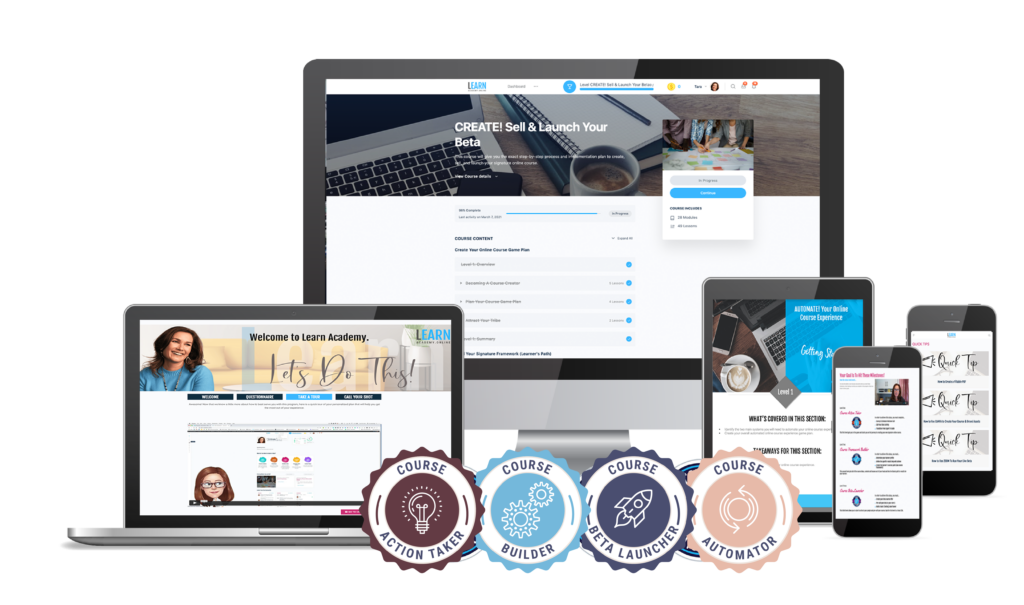The Journey From Concept to Profitable Online Program Experience
Creating and selling an online program is no longer reserved for tech giants or marketing gurus. With the right approach, experts across industries can build, validate, and sell digital products that generate sustainable income.
The key lies in combining lean startup methodology with authority-based marketing —allowing you to test quickly and sell authentically.
Whether you’re an industry veteran looking to monetize your expertise or an entrepreneur with a solution to a common problem, this blog post will walk you through the proven process of bringing your online program to market without getting lost in complex sales funnels or aggressive marketing tactics.
From building a minimum viable product that actually validates your concept to establishing yourself as a trusted authority who can sell with ease, you’ll discover actionable strategies that have helped thousands of online creators turn their expertise and ideas into profitable digital businesses.
Key Questions to Selling Your Online Program
- Why starting with a beta MVP dramatically increases your chances of market success
- How to validate your online program with real users before full development
- The authority framework that positions you as the obvious choice in your niche
- Simple but effective selling strategies that feel natural, not pushy
- Pricing models that maximize both conversions and revenue
- How to gather testimonials and case studies that do the selling for you
- Scaling strategies for when you’re ready to grow beyond your initial audience
Let’s dive into the step-by-step process of creating and selling an online program that your audience will love—and pay for.
1. The Growing Market for The Expert-Driven Online Program & Experience
The online program & experience market has exploded in recent years, with the global e-learning market projected to reach $457.8 billion by 2026. This growth isn’t limited to traditional online courses—it includes interactive workshops, membership communities, coaching programs, digital products, and software experiences.
What’s driving this surge?
Several factors:
- Accessibility: Anyone with internet access can participate
- Scalability: Creators can serve hundreds or thousands with the same effort
- Flexibility: Consumers enjoy learning and engaging on their own schedules
- Global reach: Geographic limitations disappear in the digital space
- Reduced overhead: Lower costs compared to physical businesses
However, with this opportunity comes a challenge: Competition.
Standing out in a crowded digital marketplace requires both a superior offering and a strategic approach to selling.
That’s where our two-pronged strategy comes in—starting with a lean, testable MVP and building an authority-based sales framework.
2. Starting with an MVP for Your Online Program: Why and How to Validate Quickly
Defining Your Minimum Viable Product
The concept of a Minimum Viable Product (MVP) originated in the software development world but applies perfectly to online experiences. An MVP is the simplest version of your offering that delivers enough value for customers to use and provide feedback.
For an online program experience, an MVP might be:
- A mini-course covering just one core concept of your full curriculum
- A beta version of your membership community with limited features
- A stripped-down version of your software with only essential functionality
- A group coaching program before developing a self-paced experience
The goal isn’t perfection—it’s validation. As Reid Hoffman, LinkedIn co-founder, famously said: “If you’re not embarrassed by the first version of your product, you’ve launched too late.”
Beta Testing Frameworks
Your beta testing phase is critical for refining your online program & experience before a full launch.
Here’s a framework for effective beta testing:
- Create a Beta Testing Playbook: This will set the step-by-step plan for launching a beta experience
- Recruit the right testers: Find people who match your target audience but will give honest feedback
- Create structured feedback loops: Use surveys, user interviews, and analytics to collect insights
- Implement fast iterations: Make improvements quickly between feedback cycles
Gathering Actionable Feedback
Not all feedback is created equal. Focus on collecting insights that drive decisions using these approaches:
- Behavior over opinions: What users do is more important than what they say
- Problem identification: Look for patterns in user struggles
- Completion rates: Track how many finish the experience and where dropoffs occur
- Transformation evidence: Document concrete results users achieve
- Implementation metrics: Measure how much of your teaching gets applied
Use this feedback to make targeted improvements to your MVP before scaling up your marketing efforts.
3. Build Your Authority Framework
Create Your Signature Methodology
One of the most powerful selling tools is a clearly defined, proprietary methodology. This gives potential customers a concrete framework to understand your approach and distinguishes you from competitors.
Your signature methodology should:
- Have a memorable name that’s easy to reference
- Include distinctive steps or phases (ideally 7-9 steps and 3 Phases)
- Address common pain points and objections
- Produce predictable, replicable results
- Reflect your unique perspective or expertise
Content Pillars That Establish Expertise
Before potential customers buy your online program & experience, they need to trust your expertise.
Authority marketing built around strategic pillars helps establish this authority:
- Educational content: Demonstrate your expertise through blogs, podcasts, or videos
- Process insights: Share your methodology and approach to solving problems
- Results showcases: Highlight outcomes you’ve achieved for yourself or others
- Industry analysis: Provide thoughtful perspectives on trends and developments
- Common misconceptions: Debunk myths in your field to demonstrate deeper context
Consistently publishing content across these pillars builds a body of work that serves as evidence of your expertise—making the sales process significantly easier when you launch your online program & experience.
Case Study: How Experts Become the Obvious Choice
Let’s examine how business coach Fred Smith built his authority to become the go-to expert for coaching practice growth:
- Narrow specialization: He focused exclusively on business coaches (not life coaches, health coaches, etc.)
- Named framework: Created the “Black Belt” coaching system with clear levels
- Concrete metrics: Focused on helping coaches reach “double your income, half your hours”
- Content consistency: Published weekly videos demonstrating specific tactics
- Results documentation: Regularly featured client success stories showing system effectiveness
By the time potential customers encounter his paid offerings, they’ve already been exposed to his methodology and results, making the purchasing decision far easier. The sale becomes a logical next step rather than a persuasion challenge.
4. Sales Strategies for Non-Salespeople
Value-Based Selling Approaches
Nobody wants to feel “sold to,” especially when considering an online program & experience.
Value-based selling reframes the transaction from “convincing someone to buy” to “helping someone solve a problem they already want to solve.”
Implement these value-based approaches:
- Outcome focus: Emphasize the transformation, not just the features
- ROI calculation: Help prospects really picture the return on their investment
- Before/after scenarios: Paint a clear picture of life before and after your solution
- Risk reversal: Offer meaningful guarantees that shift risk from buyer to seller
- Alternative cost analysis: Compare your solution to other ways of solving the same problem
For example, instead of saying “My course has 6 modules and 24 videos,” say “After completing this experience, you’ll be able to launch your podcast and secure your first 1,000 downloads—skills that would take 6-12 months to learn through trial and error.”
Authentic Demonstration Techniques
The most effective way to sell an online program & experience is to give prospects a taste of what they’ll receive.
Consider these demonstration strategies:
- Free workshops: Deliver a condensed version of your teaching style
- Challenge events: Run a short, outcome-focused event (5-day challenges work well)
- Sample lessons: Provide one complete module from your course
- Behind-the-scenes tours: Show the experience interface and community
- Live Q&As: Demonstrate your expertise by solving real problems in real time
Software entrepreneur Nathan Barry built ConvertKit to a $30M+ business largely through educational webinars that demonstrated his email marketing expertise—building trust first and presenting his software as the logical tool for implementation.
Objection Handling Templates
Even with solid authority and value demonstration, prospects will have concerns. Prepare for these common objections with thoughtful responses:
“I don’t have enough time right now.” Response template: “That’s exactly why [experience name] is designed with [specific time-saving feature]. Many of our successful students started while [similar busy situation], and the structure actually helped them [specific benefit].”
“It’s too expensive for me.” Response template: “I understand budget considerations are important. When our students calculated the cost of [alternative solution] or the potential revenue from [outcome of experience], they found this investment returned [specific ROI] within [timeframe].”
“I need to think about it.” Response template: “Of course, it’s a decision worth considering. To help with that, I’ve prepared [decision-making resource] that addresses the most common questions. Also, our [guarantee details] ensures you can try the experience risk-free.”
The key with objection handling is preparation, empathy, and focusing on the transformation rather than defending your offering.
5. Pricing and Packaging Your Online Program & Experience
Tiered Pricing Models
Offering multiple pricing tiers increases overall revenue by catering to different customer segments:
Basic Tier
- Core content only
- Self-paced access
- Email support
- Priced for accessibility (often 1x)
Standard Tier
- Core content plus expanded resources
- Group implementation calls
- Community access
- Priced at value sweet spot (often 2-2.5x basic)
Premium Tier
- Everything in standard plus personal attention
- 1:1 coaching/consulting
- Advanced features or materials
- Priced for premium buyers (often 4-5x basic)
Limited-Time Launch Strategies
Creating urgency around your online experience drives decision-making. Effective launch strategies include:
- Early-bird pricing: Offer a discount for early adopters
- Bonuses with deadlines: Add valuable extras that expire at specific times
- Cohort-based enrollment: Open registration only during specific windows
- Capacity limits: Restrict the number of participants (especially if offering direct support)
- Price increases: Communicate transparent plans for future price increases
Subscription vs. One-Time Payment Considerations
Your pricing structure dramatically impacts both customer psychology and business sustainability:
One-Time Payment Benefits
- Higher initial cash flow
- No recurring billing to manage
- Customer motivated to complete experience
- Often perceived as better value by customers
Subscription Benefits
- Lower barrier to entry
- Predictable recurring revenue
- Encourages ongoing engagement
- Natural customer retention incentives
Many successful online experience creators offer both options—a subscription with monthly payments and a one-time payment at a slight discount (typically priced at 10-12 months of the subscription rate).
6. Scaling Beyond Your Initial Audience
Strategic Partnerships
Once your online program & experience is validated with your initial audience, partnerships can accelerate growth:
- Affiliate relationships: Enlist others to promote your experience for a commission
- Co-creation opportunities: Collaborate with complementary experts
- Industry associations: Partner with organizations your audience already trusts
- Integration partnerships: Connect with tools your customers already use
- Content collaborations: Create joint webinars, podcasts, or articles
Automation and Systems
As your online program & experience grows, implementing systems becomes crucial:
- Customer onboarding automation: Create seamless welcome sequences
- Support documentation: Develop comprehensive FAQs and troubleshooting guides
- Team scaling: Identify which roles to hire first (often community managers or support)
- Content repurposing: Establish workflows to maximize the value of created content
- Feedback collection systems: Implement structured ways to gather ongoing insights
When to Expand Your Offerings
Knowing when to create additional experiences is a critical scaling decision:
- Customer journey mapping: Identify logical next steps for successful customers
- Complementary needs analysis: Look for adjacent problems your audience faces
- Profitability threshold: Ensure your core offering is sustainable before diversifying
- Operational capacity: Confirm you can maintain quality while expanding
- Market feedback: Listen for recurring requests from your customers
7. Conclusion: Action Steps to Implement Today
Creating and selling a successful online program & experience is a journey that combines lean startup principles with authority marketing strategies.
The most successful creators aren’t necessarily the best marketers—they’re the ones who build valuable experiences and position themselves as trusted guides.
To implement the strategies in this guide, start with these action steps:
- Define your MVP: What’s the simplest version of your online program & experience you could test with real users in the next 30 days?
- Draft your signature methodology: Map out the framework that makes your approach unique and effective
- Create your authority content plan: Identify 3-5 content pillars and plan your first month of authority-building content
- Design your tiered offering: Develop basic, standard, and premium versions of your experience
- Identify potential beta testers: Make a list of 10-20 people who fit your ideal customer profile for initial testing
Remember that successful online experiences aren’t built overnight. They evolve through iteration, feedback, and consistent authority building.
By combining a lean MVP approach with strategic authority marketing, you create a sustainable path to selling your online program & experience without becoming a marketing expert.
Start small, focus on delivering genuine transformation, and let your results speak for themselves.
Your expertise deserves to be shared—and sold—effectively.
If you are ready to get support to sell your online program and experience, schedule a time to talk with us to see if Learn Academy Mentorship.







